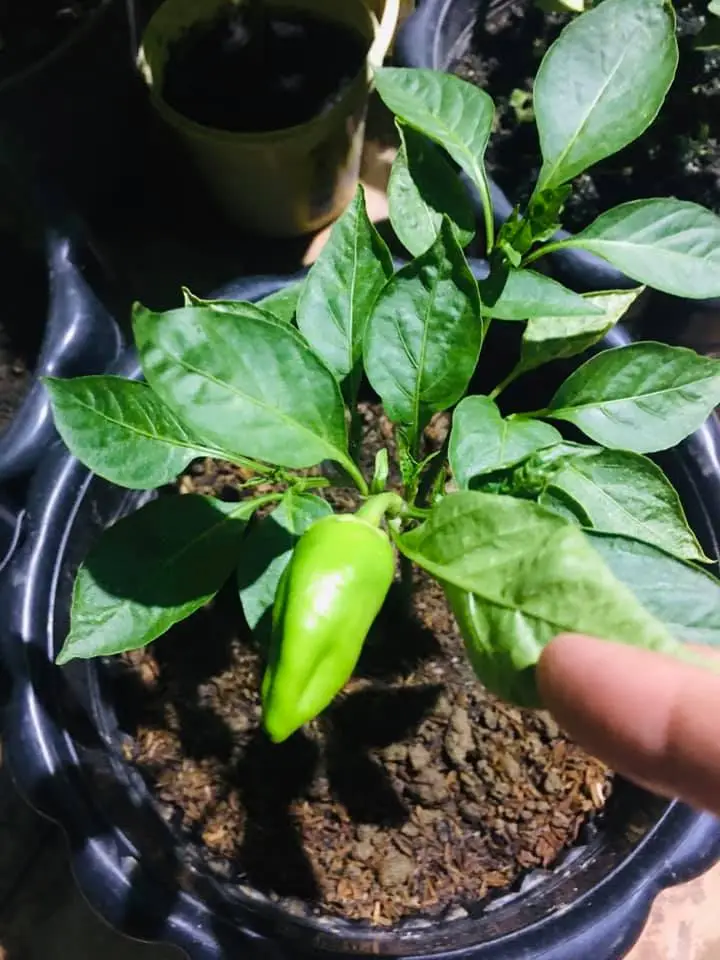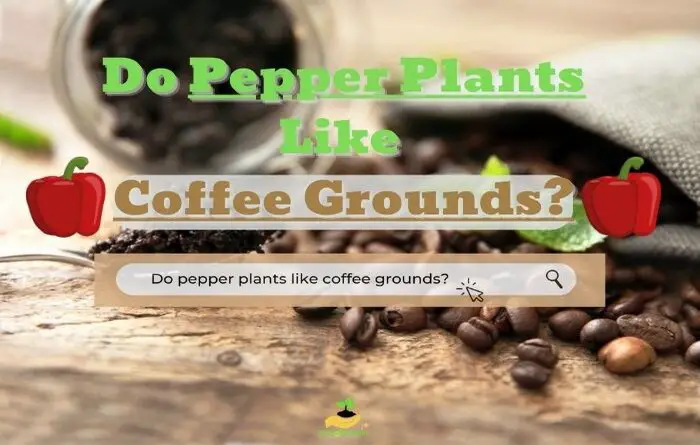Do Pepper Plants Like Coffee Grounds? (Quick Answer Here)
Pepper plants are one of the most popular plants grown in home gardens. If you’re a coffee lover and a gardener, you may be wondering if you can use coffee grounds to fertilize your pepper plants.
Gardeners are always looking for ways to maximize the growth and success of their pepper plants. Coffee grounds are one of the best valuable fertilizers. It is a popular household waste product and is commonly discarded as trash.
Do pepper plants like coffee grounds? The answer is definitely YES! Coffee grounds have several properties that make them excellent for pepper plant growth. They help create a desirable, slightly acidic soil in which peppers thrive. It is scientifically proven that coffee grounds are rich in nitrogen and are a natural fertilizer.
Benefits of Using Coffee Grounds for Pepper Plants
The key benefits of using coffee grounds for peppers are:
1. Coffee grounds help to create an acidic soil, with a pH between 5.5 and 6.5. It is a perfect pH to grow pepper plants.
2. Coffee grounds are rich in nitrogen, a natural fertilizer. Nitrogen helps pepper plants grow strong and healthy.
3. We can use it as mulch or as compost on your garden beds. The fresh Coffee grounds help preserve water by keeping the soil moist.
4. Improves soil structure: Coffee grounds can improve soil structure and drainage, especially in heavy or clay soils. They also attract earthworms, which help to aerate the soil and distribute the nutrients.
5. Slugs and snails are known to damage pepper plants, so professional gardeners use Coffee grounds as a pest repellent. The caffeine in the coffee grounds is enough to repel these pests.
6. Coffee grounds contain micronutrients that help your peppers grow strong, like magnesium and potassium (which are both needed for photosynthesis).
7. Eco-friendly: Using coffee grounds as fertilizer is an eco-friendly alternative to synthetic fertilizers. It reduces waste by reusing coffee grounds that would otherwise be discarded and also reduces the use of harmful chemicals that can harm the environment.
Using coffee grounds for pepper plants is an easy and effective way to give your peppers the well-rounded care they need to thrive!
How Often to Use Coffee Grounds for Pepper Plants
Use it to fertilize pepper plants every month. For best results, apply coffee grounds around the plant’s base, ensuring it is not touching the pepper leaves.
The Best Type of Coffee Grounds for Pepper Plants
Things to consider when choosing the best type of coffee grounds for your pepper plants.
- Grind size: Rigid grounds drain more slowly and retain more moisture, while finer grounds will drain more quickly and need less watering.
- Type of coffee beans: Darker roasted coffee beans have a higher concentration of nutrients, while lighter roasts are lower in nutrients. Ensure the coffee grounds are organic and free from pesticides or other chemicals.
- The freshness of the grounds: Older grounds will have fewer nutrients and may even harm your plants. Always use fresh coffee beans.
Signs That Your Pepper Plant Likes Coffee Grounds

You want to ensure it’s happy, but how can you tell if your pepper plants love coffee grounds? Here are some signs that your pepper plant is comfortable when being fed with coffee grounds:
Soil Quality
Coffee grounds help increase the soil’s acidity, so it’s a good sign if your soil is no longer dry and crumbly. Instead, look for it to be crumblier and full of organic matter. You will notice more earthworms in the ground, indicating a suitable environment for your plants.
Plant Growth
As we all know, Coffee grounds are packed with nitrogen, potassium, and phosphorus, essential nutrients that drive healthy growth in plants. So look out for strong stems and lush foliage when determining if your pepper plant loves coffee!
Smell Test
Your pepper plant won’t say thank you, but there is an easy way to determine how much it loves the coffee grounds. Grab a handful of soil and whiff. Does it smell like freshly brewed coffee? Then you know your pepper is getting its daily dose of happy juice.
How Much Coffee Grounds for Pepper Plants?
When it comes to using coffee grounds for pepper plants, it’s important to use them in moderation. As a general rule of thumb, you should aim to use no more than 10-20% coffee grounds in your soil mix or compost. This means that for every 10 cups of soil or compost, you can use up to 2 cups of coffee grounds.
When applying coffee grounds directly to the soil around pepper plants, use no more than 1/4 cup of coffee grounds per plant. It’s best to mix the coffee grounds with other organic matter, such as compost or leaf mold, to avoid over-fertilizing the soil.
How Many Coffee Grounds Per Plant?
Use two tablespoons in a two-foot radius around each pepper plant. While adding it as fertilizer later in the season, add up to four tablespoons per two-foot radius once a month. Aim to use no more than 20% coffee grounds in the soil mixture or as a top dressing around the base of the plants.
How to Use Coffee Grounds for Pepper Plants?
Things you should keep in mind before using it:
- Completely dry it before spreading it in the soil.
- Use these grounds carefully. Too large an amount makes the soil too acidic for pepper plants. The best way to use about 1/4 cup of coffee grounds per plant.
- Be sure to mix the coffee grounds into the soil well so that they are evenly distributed.
To use coffee grounds as fertilizer for pepper plants, follow these steps:
- Collect coffee grounds: Collect used coffee grounds from your coffee machine or coffee shop. You can also buy pre-brewed coffee grounds from the store.
- Dry the coffee grounds: Spread the coffee grounds on a tray and allow them to dry completely. This will prevent them from becoming moldy or attracting pests.
- Mix coffee grounds with soil: Mix the dried coffee grounds into the soil before planting your pepper plants. Aim to use no more than 20% coffee grounds in the soil mixture.
- Apply as top dressing: Apply a layer of coffee grounds around the base of the pepper plants as a top dressing. Avoid getting the coffee grounds directly on the leaves or stems, as this can cause burning.
- Water thoroughly: Water the plants thoroughly after applying the coffee grounds. This will help to distribute the nutrients in the soil.
- Monitor plant growth: Monitor the growth of your pepper plants after applying the coffee grounds. If the plants show signs of stress or burning, reduce the amount of coffee grounds used.
- Repeat every six weeks during summer months–but again remember not overdo it! Do not combine this method with any other fertilizer type because will likely lead to excess amounts of some macronutrients.
Alternative to Coffee Grounds as Fertilizers for Peppers
If you can’t afford coffee grounds as a fertilizer, the other alternative fertilizers you can use are:
- A balanced fertilizer blend
- Compost
- Nettle manure
- Animal manure
- Fish emulsion
- Bone meal
- Seaweed or kelp meal
These fertilizers provide rich essential nutrients for plant growth and development without altering soil pH levels.
How to Use Coffee Grounds In Gardening For Ideal Results?
There are several ways to use coffee grounds to get optimal results:
- Use coffee grounds in moderation. Too much coffee grounds burns nitrogen and decreases the soil’s pH level.
- Mix it with other organic materials, like compost or leaf litter. This combination will improve your soil texture and structure.
- Regularly test the pH level of your garden soil. Make sure it remains within the ideal range for your plants.
- Use coffee grounds and other fertilizers to provide a balanced nutrient mix for your plants.
Myth vs. Reality: Do Peppers Really Like Excessive Use of Coffee Grounds?
There is a common belief that peppers enjoy excessive use of coffee grounds, but this is a myth. The reality is that there may be better options than the excessive use of coffee grounds in your garden for pepper growth.
Peppers plants prefer acidic to neutral soil, with pH levels between 6.0 and 6.8. The excessive use of coffee grounds can cause the soil’s pH level to drop, leading to nutrient deficiencies and stunted growth in peppers. When using it as a fertilizer for peppers, use it in moderation.
| Pros of using coffee grounds for pepper plants | Cons of using coffee grounds for pepper plants |
|---|---|
| Contains nitrogen that can promote plant growth. | Overuse can lead to over-fertilization and excessive foliage growth. |
| Can help lower the pH of soil, which can be beneficial for acid-loving plants like peppers. | Excessive use can make soil too acidic and lead to nutrient deficiencies. |
| Can help improve soil structure and moisture retention. | Potential for mold and bacterial growth if not properly composted before use. |
| Can repel certain pests like ants and slugs. | Caffeine toxicity(excess use) can build up in soil and inhibit plant growth or even kill the plants. |
| Reduces waste by reusing coffee grounds instead of discarding them. | Can attract pests like slugs and snails, which can damage the plants. |
Precautions to Take When Using Coffee Grounds in Pepper Plants
Here are some precautions to take when using coffee grounds in pepper plants:
- Use in Moderation: Coffee grounds are high in nitrogen, which can be beneficial for pepper plants. However, too much nitrogen can cause excessive growth and reduce fruit production. To avoid over-fertilization, use coffee grounds sparingly and mix them with other organic matter, such as compost or leaf mold.
- Avoid Fresh Grounds: Fresh coffee grounds are acidic and can lower the pH of the soil. This can be harmful to pepper plants, which prefer a slightly acidic soil pH of around 6.0 to 6.8. To avoid soil acidity, use only fully composted coffee grounds or those that have been allowed to sit for several months.
- Apply to the Soil, Not the Leaves: When using coffee grounds in pepper plants, it’s best to apply them directly to the soil around the base of the plant. Avoid applying coffee grounds to the leaves, as this can cause leaf burn and other damage.
- Monitor Soil Moisture: Coffee grounds can absorb moisture from the soil, which can lead to dryness and dehydration in pepper plants. To prevent this, make sure to monitor soil moisture levels and water pepper plants regularly.
- Only use dry coffee grounds in moderation.
- Test the soil’s pH level regularly to ensure it remains within the ideal range for your plants.
Do chili plants like coffee grounds?
Yes, chili plants can benefit from the use of coffee grounds as a natural fertilizer. Coffee grounds are a great source of nitrogen and can help pepper plants grow healthy, which is why peppers love them. You can sprinkle grounds around the pepper plants in the garden.
Do jalapeno plants like coffee grounds?
Yes, jalapeno plants can benefit from the use of coffee grounds as a fertilizer. Coffee grounds contain nitrogen, phosphorus, and potassium, which are all essential nutrients for plant growth.
However, it’s important to use coffee grounds in moderation and mix them with other organic matter, such as compost or leaf mold, to avoid over-fertilizing the soil.
Impact of Coffee Grounds On Soil pH
Coffee grounds are acidic, which means they can lower the soil’s pH level. It can be suitable for plants that prefer acidic soil. However, coffee grounds can harm plants that prefer neutral or alkaline soil, such as peppers. If the soil’s pH level is too low, it can lead to nutrient deficiencies and stunted plant growth.
Remember, the ideal pH level for most plants is between 6.0 and 7.0.
Impact of Coffee Grounds On Plant Growth
The effect of coffee grounds on plant growth depends on these factors:
- type of plant,
- the number of coffee grounds used in the soil,
- the pH level of the earth.
Regular use of coffee grounds in your garden may be helpful for plants such as tomatoes and roses but may not be suitable for peppers. A pro tip is to use them in moderation, as too much can burn nitrogen. Nitrogen deficiency causes plant damage and stunted growth.
Conclusion
Overall, pepper plants benefit from the addition of coffee grounds. The grounds add essential nutrients to the soil, encourage beneficial microorganisms, and help retain moisture. Therefore, adding coffee grounds to your pepper plants is an excellent way to ensure they are healthy and flourishing.
Pepper plants can benefit from coffee grounds when used properly. Coffee grounds are a great source of nitrogen, potassium, and phosphorus, which are all essential nutrients for plant growth. They can also improve the soil structure and drainage. However, it’s important to use coffee grounds in moderation as they can be acidic, and too much acidity can harm the pepper plants.
Yes, coffee grounds can help chili pepper plants in the same way that they can help other pepper plants. Chili pepper plants, like other peppers, require nitrogen, phosphorus, and potassium to grow and produce fruit. Coffee grounds contain all three nutrients, making them a good natural fertilizer option.
The benefits of using coffee grounds for pepper plants include improved soil structure and moisture retention, repelling certain pests, and lowering the pH of soil for acid-loving plants like peppers.
Green peppers, like most peppers, can benefit from the nutrients found in coffee grounds. Coffee grounds are a good source of nitrogen, which is an essential nutrient for plant growth. Nitrogen promotes the growth of leaves and stems, which are important for photosynthesis and the overall health of the plant.




